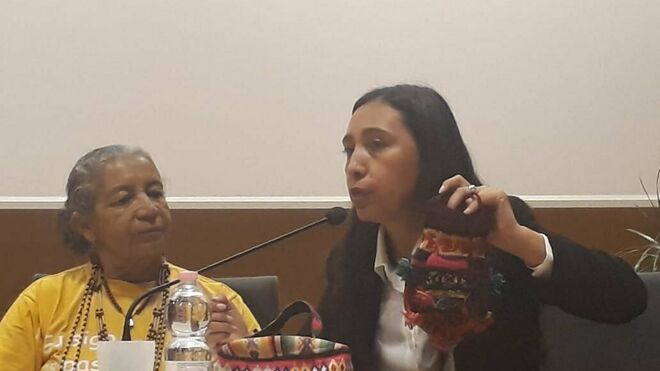A Reflection on Water Amidst a Pandemic
Tania Avila Meneses, an indigenous theologian with the Amerindia Network who works at the Maryknoll Mission Center in Cochabamba, Bolivia, wrote the following reflection for World Water Day 2020.
Tania Avila Meneses, an indigenous theologian with the Amerindia Network who works at the Maryknoll Mission Center in Cochabamba, Bolivia, wrote the following reflection for World Water Day 2020. The following article was published in the May-June 2020 issue of NewsNotes.
Today, March 22, is World Water Day. I am reminded of a ritual I shared with my Mapuche sisters and brothers in 2017, a time of drought in Bolivia. That day we were surprised by a heavy rain. We assumed the ritual wouldn’t take place, but to our great surprise they told us that it was just the right weather, rain falling in the patio of the house where we gathered, water running across the floor like a river, trees playing with the abundant rain. It was in this setting that we held a trust exercise: total trust in the other – in the midst of uncertainty.
They dress in blacks and blues, adorned with silver jewelry arranged so they amplify the sound of the rain, their handwoven shawls like wings. Together, these create a safe place… a Common Home.
The Mapuche, in their ritual, are dancing birds who, with their stillness-movement-pause rhythm, make waters flow. Birds who draw the peace of the wind with wings open to the immensity of the universe and draw the peace of the earth to feet planted lovingly, affirmingly, roots in the wet soil, one with the sound of the rain. They embody vital blockages, then transform them through dance with an attentive look and precise movements – a powerful simplicity, the combination of peace and movement bestow liberation.
This dance is a synchronicity of bodies in dialogue with the water, land, and air, translating into symbolic language humanity’s search for that “je ne sais quoi” that releases the energy of an integral life, like fire in the rain.
Three years later, in the context of great uncertainty, vulnerability, pandemic, I remember the water that unites us as peoples. It makes us human and, paradoxically, with it we create divisions between countries, between rich and poor. This pandemic reminds us that water, the washing of hands, is part of the solution. In this time marked by death, might it not be that we allow the energy of life to flow anew by restoring the dignity of water? By remembering that we are 65 percent water and thus we are not owners of water, but water itself?
Photo by Claudio Jofre Larenas available via flickr.

